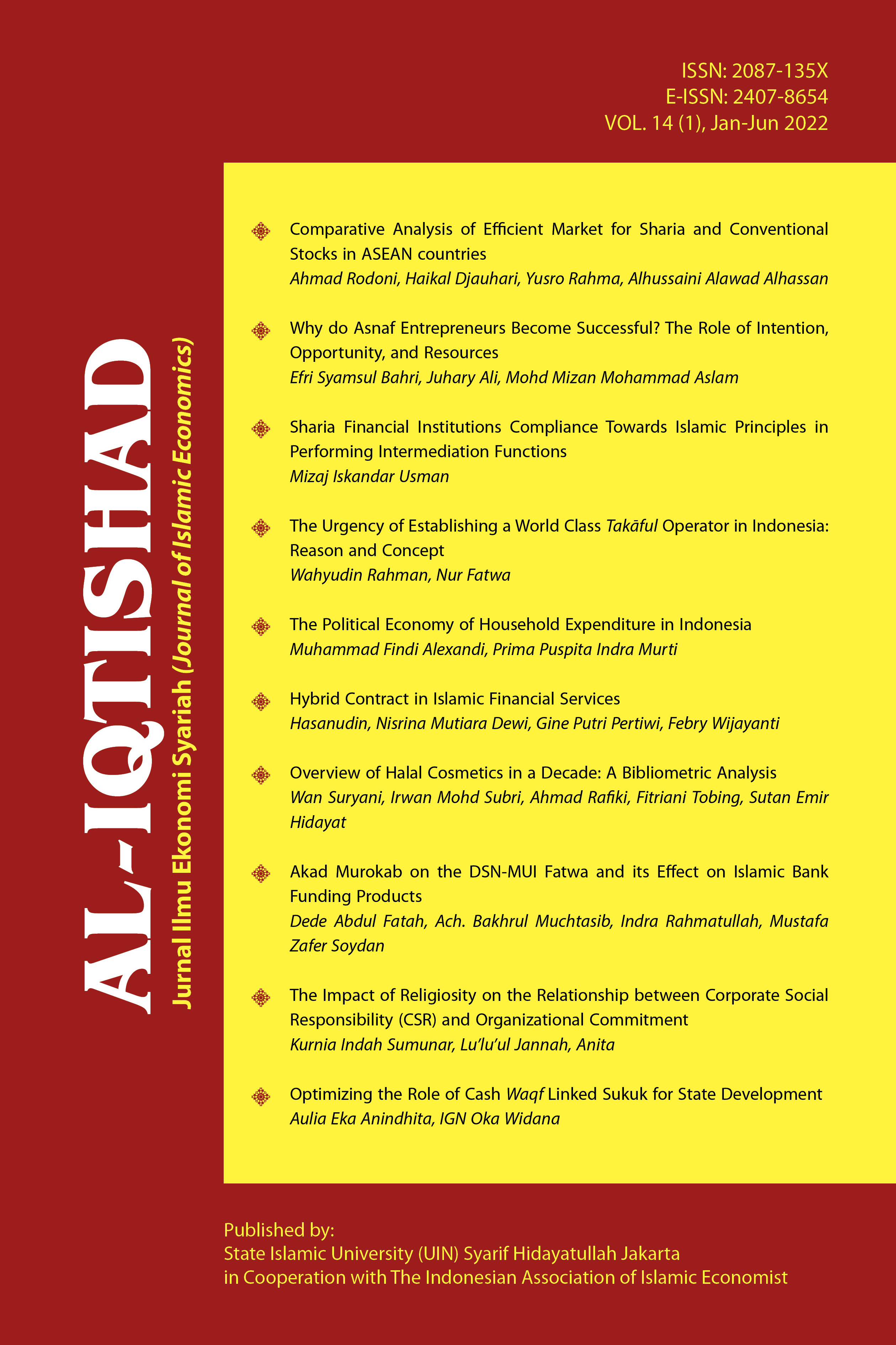Sharia Financial Institutions Compliance Towards Islamic Principles in Performing Intermediation Functions
DOI:
https://doi.org/10.15408/aiq.v14i1.25632Keywords:
Islamic Principles, DSN-MUI, Sharia Supervisory Board, Islamic Financial Institutions, Sharia ComplianceAbstract
This study aims to determine the factors of non-compliance with Islamic principles in Islamic Financial Institutions (IFIs). This article argues that IFIs must comply with Islamic principles based on the DSN-MUI fatwa, even though in the Indonesian legal hierarchy, DSN-MUI fatwas are not binding. IFIs show ambiguity in complying with Islamic principles when carrying out their intermediation function. Several other factors also cause IFIs' lack of compliance with sharia principles. These include the lack of applicability of the DSN-MUI fatwas, the conflict of interest of the Sharia Supervisory Board (SSBs), and competency issues among SSBs members. To address these issues, it is necessary to strengthen the regulations that make DSN-MUI an authoritative institution in establishing the sharia principles and the fatwas methodology. Thus, the fatwas are more applicable and avoid ambiguity. Furthermore, SSBs need re-structurization to be independent internal supervisory agencies.
Abstrak
Penelitian bertujuan mengetahui faktor-faktor ketidakpatuhan lembaga keuangan syariah (LKS) pada prinsip-prinsip Islam. Artikel ini menyebutkan LKS harus mematuhi prinsip-prinsip Islam sesuai fatwa DSN-MUI, walaupun dalam hierarki hukum Indonesia, DSN-MUI bukanlah sebuah lembaga otoritatif yang menerbitkan hukum mengikat. LKS tampak ambigu dalam mematuhi prinsip-prinsip Islam saat menjalankan fungsi intermediasinya. Ketidakpatuhan LKS kepada prinsip-prinsip syariah juga disebabkan oleh beberapa faktor lain, seperti: tidak aplikatifnya fatwa DSN-MUI; munculnya konflik kepentingan DPS; dan masalah kompetensi anggota DPS. Untuk mengatasi masalah-masalah tersebut, perlu adanya perbaikan regulasi yang menjadikan DSN-MUI sebagai lembaga otoritatif, agar fatwa yang dikeluarkan lebih aplikatif dan tidak menimbulkan multi tafsir. Sementara dari sisi DPS, perlu adanya regulasi merestrukturisasi organisasi DPS dengan menepatkannya sebagai lembaga pengawas internal yang independen.
References
Abu Hasan al-Mawardi. (2020). Al-Hawi Al-Kabir (VII, Vol. 22, Issue 2). Dar al-Fikr. https://doi.org/10.22373/jms.v22i2.8029
Achmad Soediro, I. M. (2018). Maqasid Sharia As A Performance Framework For Islamic Financial Institutions. Jurnal Akuntansi Multiparadigma, 9(1), 70–86
Adinugraha, H. H., Nasution, I. F. A., Faisal, F., Daulay, M., Harahap, I., Wildan, T., Takhim, M., Riyadi, A., & Purwanto, A. (2021). Halal Tourism in Indonesia: An Indonesian Council of Ulama National Sharia Board Fatwa Perspective. Journal of Asian Finance, Economics and Business, 8(3), 665–673. https://doi.org/10.13106/jafeb.2021.vol8.no3.0665
Al-Nawawi, M. bin S. (2017). Majmu' Syarah al-Muhazzab (IV). Maktabah al-'Alamiyah.
Al-Zuhaili, W. (2007). Fiqh al-Islami wa Adillatuhu (IV). Dar al-Fikr.
Azid, T., & Sunar, L. (2019). Social Justice and Islamic Economics: Theory, Issues, and Practice (1st ed., Vol. 1, Issue 1). Routledge. https://doi.org/10.29300/aij.v5i2.2059
Bank Indonesia. (2021). Laporan Ekonomi dan Keuangan Syariah 2021. In Angewandte Chemie International Edition, 6(11), 951–952.
Biyantoro, A., & Ghoniyah, N. (2019). Sharia Compliance and Islamic Corporate Governance. Trikonomika, 18(2), 69–73. https://doi.org/10.23969/trikonomika. v18i2.1465
Dwi Saputro, A., Rois, A. K., & Bazi, U. Al. (2018). Heart Half Implementation Sharia Banking In Indonesia. Ikonomika: Jurnal Ekonomi Dan Bisnis Islam, 3(2), 127–138. https://doi.org/10.24042/febi.v3i2.3258
Hasyim, S. (2019). Fatwas and Democracy: Majelis Ulama Indonesia (MUI, Indonesian Ulema Council) and Rising Conservatism in Indonesian Islam.
Herry, E., Yuli, P., Permana, E., Aji, W. B., & Muhtadi, R. (2019). Total Quality Management Development and Sharia Governance Efforts in Sharia Micro Financial Institutions to Improve Market Share. International Journal of Integrated Education, Engineering and Business, 1(1), 27–35.
Ibrahim, A., & Salam, A. J. (2021). A comparative analysis of DSN-MUI fatwas regarding murabahah contract and the real context application (A study at Islamic Banking in Aceh). Samarah, 5(1), 372–401. https://doi.org/10.22373/sjhk.v5i1.8845
Jaballah, J., Peillex, J., & Weill, L. (2018). Is Being Sharia compliant worth it? Economic Modelling, 72(February), 353–362. https://doi.org/10.1016/j.econmod.2018.02.011
Kristianti, D. S. (2020). Integrasi Prinsip Syariah dalam Fungsi Intermediasi Lembaga Keuangan Syariah. Undang: Jurnal Hukum, 3(2), 315–339. https://doi.org/10.22437/ujh.3.2.315-339
Lindsey, T. (2014). Monopolizing Islam: The Indonesian Ulama Council and state regulation of the "Islamic economy." Bulletin of Indonesian Economic Studies, 48(2), 253–274. https://doi.org/10.1080/00074918.2012.694157
Meslier, C., Risfandy, T., & Tarazi, A. (2020). Islamic banks' equity financing, Shariah supervisory board, and banking environments Nanocell type Ru @ quinone core-shell catalyst for selective oxidation of alcohols to carbonyl compounds. Pacific Basin Finance Journal, 62(III).
Miah, M. D., & Suzuki, Y. (2020). Murabaha syndrome of Islamic banks: a paradox or product of the system? Journal of Islamic Accounting and Business Research, 11(7), 1363–1378. https://doi.org/10.1108/JIABR-05-2018-0067
Narayan, P. K., & Phan, D. H. B. (2019). A survey of Islamic banking and finance literature: Issues, challenges and future directions. Pacific Basin Finance Journal, 53(III), 484–496. https://doi.org/10.1016/j.pacfin.2017.06.006
Nugroho, E. R. (2021). Implementation Of Sharia-Compliance In Islamic Bank Product Innovations. Prophetic Law Review, 3(2). https://doi.org/10.20885/ plr.vol3.iss2.art4
Nur'aeni, N., & Setiawan, S. (2020). Third Party Funds and Non-Performing Financing for Mudharabah Financing in Indonesia's Sharia Banking. International Journal of Business, Economics, and Social Development, 1(4), 178–184. https://doi.org/10.46336/ijbesd.v1i4.96
Salman, A., & Nawaz, H. (2018). Islamic financial system and conventional banking: A comparison. Arab Economic and Business Journal, 13(2), 155–167. https://doi.org/10.1016/j.aebj.2018.09.003
Satibi, E., Utami, W., & Nugroho, L. (2018). A Comparison of Sharia Banks and Conventional Banks in Terms of Efficiency, Asset Quality and Stability in Indonesia for The Period 2008-2016. International Journal of Commerce and Finance, 4(1), 134–149.
Widyastuti, U., Febrian, E., Sutisna, S., & Fitrijanti, T. (2020). Sharia compliance in sharia mutual funds: A qualitative approach. International Journal of Economics and Business Administration, 8(3), 19–27. https://doi.org/10.35808/ijeba/483
Zein, F. (2018). Legislation Fatwa National Sharia Board-Indonesian Council of Ulama (DSN-MUI) in the State Economic Policy. Jurnal Cita Hukum: Indonesian Law Journal, 6(1), 10–27.

